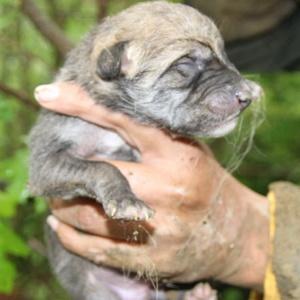13
May
In the News: Rare Mexican Wolf Cubs Born In NY
 This Mexican wolf pup (pictured, shown 18 hours after being born in Westchester along with a brother) carries the fate of his rare and endangered species.
This Mexican wolf pup (pictured, shown 18 hours after being born in Westchester along with a brother) carries the fate of his rare and endangered species.Scientists are crossing their fingers that the offspring of these healthy pups will be candidates for release into the wild. Under an ambitious, federally funded program — the Mexican Wolf Species Survival Plan — the newborns will be raised in the hope they can prevent the extinction of one of North America’s rarest mammals, which currently number only 300 in captivity and about 75 in the wild.
All but seven Mexican wolves were wiped out by hunters and urban expansion in Arizona and New Mexico by the early 1970s, when conservationists stepped in to save the rarest subspecies of the gray wolf.
On Wednesday, the brothers were plucked from their den at the Wolf Conservation Center in South Salem as their shy parents stood at a distance. They were immediately flown on a private jet and bottle-fed until they arrived at their new home, the Mesker Park Zoo & Botanic Garden in Evansville, Ind. — where they will be raised by foster wolf parents with a successful record of raising pups.
Maggie Howell, who runs the Westchester center, explained that the drastic measure, guided by the federal Mexican Wolf Species Survival Plan, had to be taken because the pups were in harm’s way. Last year, their mother, only known as No. F749, who mated with a different male, had a litter of eight. The WCC staff followed protocol and stayed out of the lobos’ way to allow the new parents to do their job, but all the pups died in the first month. The cause could not be determined.
“It’s such an emotional and sensitive decision to pluck these pups away from their mother. I think at some level you just have to hope that this is something bigger than their pack,” she said.
“Perhaps it’s unrealistic to think they know that, but their contribution will not only enhance their family but help benefit their wild kin in the future and save the species.”
Wildlife experts don’t rely on plain luck to find healthy genetic “value” within the Mexican wolf population — the MWSSP uses management software to determine which wolves have the most beneficial gene variations to be passed down through future generations. A total of 22 Mexican and three red wolves live in captivity on the 27-acre wooded spread. The center also has three ambassador wolves, who were raised by humans and travel for educational purposes.
So far, the Wolf Conservation Center has had pretty good success.
Two of their wolves have been released into the wild.
This article appeared in the New York Post on May 12, 2013
The letters to the editor page is one of the most widely read, influential parts of the newspaper. One letter from you can reach thousands of people and will also likely be read by decision-makers. Tips for writing your letter are below, but please write in your own words, from your own experience.
Submit your letter to the Editor of the New York Post here.
Letter Writing Tips & Talking Points
Below are a few suggestions for ensuring your message gets through clearly-your letter will be most effective if you focus on a few key points, so don’t try to use all of these. If you need additional help or want someone to review your letter before you send it, email it to info@mexicanwolves.org.
Start by thanking paper for publishing this article. This makes your letter immediately relevant and increases its chances of being published.
Express your support of wolves and stress that the majority of Arizona residents support wolves and understand their importance. Polling done by Research and Polling, Inc. found 77 percent of Arizona respondents support the reintroduction of Mexican gray wolves. The poll also showed strong majority support for giving wolves greater protection under the Endangered Species Act.
Describe the ecological benefits of wolves to entire ecosystems and all wildlife. Wildlife biologists believe that Mexican wolves will improve the overall health of the Southwest and its rivers and streams — just as the return of gray wolves to Yellowstone has helped restore balance to its lands and waters. Science has repeatedly demonstrated that wolves are keystone carnivores who help to keep wildlife like elk and deer healthy and bring balance to the lands they inhabit.
Talk about your personal connection to wolves and why the issue is important to you. If you’re a grandmother wanting your grandchildren to have the opportunity to hear wolves in the wild, or a hunter who recognizes that wolves make game herds healthier, or a businessperson who knows that wolves have brought millions in ecotourism dollars to Yellowstone, say so.
Keep your letter brief, between 150-200 words.
Provide your name, address, occupation, and phone number; your full address, occupation, and phone number will not be published, but they are required in order to have your letter published.
Photo credit: Maggie Howell



